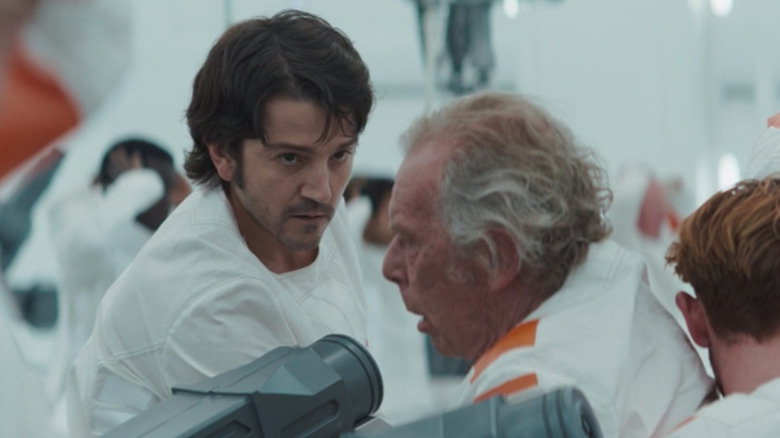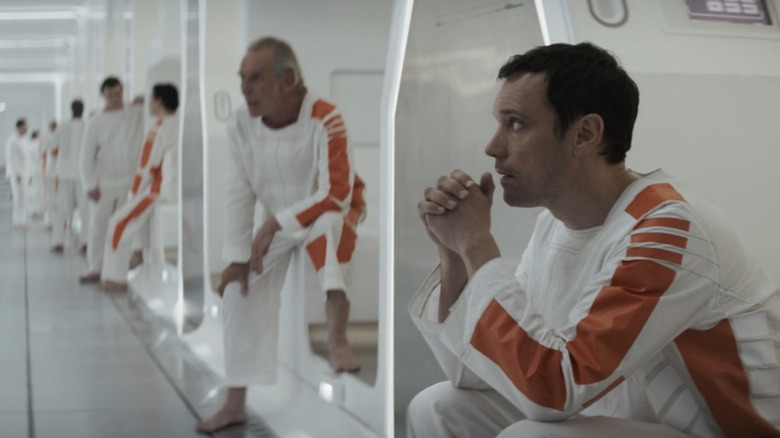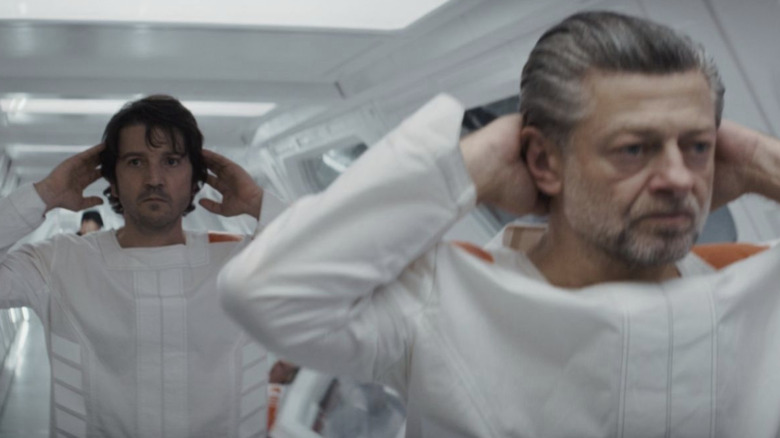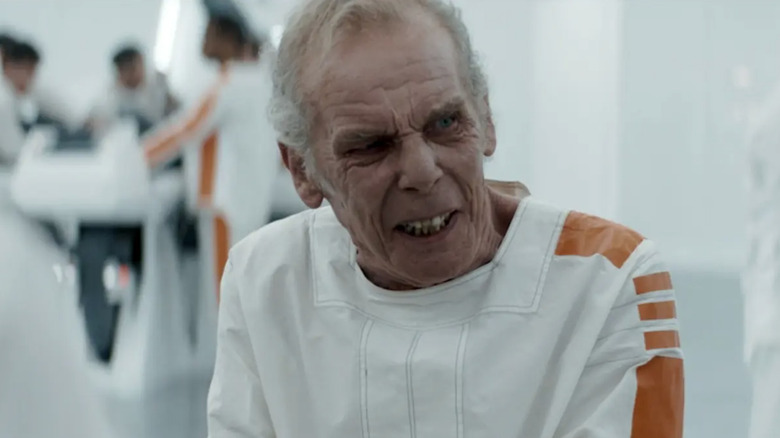
This article contains spoilers for the latest episode of "Andor."
"Andor" series creator Tony Gilroy has crafted a series that's a departure from other "Star Wars" series and shows. Not just in the characters and world-building but in its tone as well. Even from the subtitle retroactively given to the first "Star Wars" movie, hope has always been at the center of almost every "Star Wars" movie or TV show — the promise of a better tomorrow, the potential for change, and the triumph of good or evil. However, the Imperial backdrop of "Andor" delivers something of a dark twist on that message.
Since the first episode of the series, "Andor" has given audiences a deep and uncomfortable look at the inner workings of the Empire and its chokehold on the galaxy. Watching Cassian and those around him struggle to simply keep themselves afloat felt like a far cry from the rebellion we see in the mainline "Star Wars" films. Even after a supposedly "successful" mission, most of the crew Cassian was a part of died, and one even attempted to betray them to walk away with all the money. This latest arc in the first season of the series now has Cassian imprisoned, and episode 9 of "Andor," titled "Nobody's Listening!" solidifies the series as a show that's gloomy and lacking the usual hope that comes with a "Star Wars" project. And that's a good thing.
A State Of Complacency

This week's episode is filled with uncertainty and anxiety for most of the characters in the series. The Narkina 5 Imperial Factory plays a prominent role in this episode and last week's, as Cassian and the work team he was assigned to struggle to stay ahead so as not to get fried. The Imperial factory feels like a representation of those complacent with the Empire's abuse, and while "Star Wars" has done an excellent job of showing those hopeful and filled with the will to fight, it's refreshing to see there are those with more empathetic human qualities like complacency and looking out for yourself. There's no better representative of this than Kino Loy, the prison labor foreman for Cassian's cell block.
Andy Serkis gives a phenomenal performance as Kino Loy, whose anger at his situation and the Empire's power over him overflows in his treatment of his subordinate cellmates. Kino sees his freedom as only a matter of time, with every prisoner's sentence time displayed in their cell. Meanwhile, Diego Luna's performance as Cassian continues to be engaging, with his urge to resist and escape clashing with Kino Loy's wishes to keep his head down. More than just the performances of this episode, the concepts, and design of the Narkina 5 Imperial Factory lend to all sorts of uncertainty, creating tension for both the characters and the viewer.
Uncertainty And Ignorance Is In The Air

The dehumanizing treatment of prisoners and the isolation between each cell block make the design of the Narkina 5 factory one with a distinct purpose. We've been treated to all sorts of "prisons" in Star Wars movies and shows before. However, a character never stays in one long enough to show how grueling and lifeless it can be. "Andor" isn't afraid to take its time with its story, and Cassian's day-to-day work with his group shows that hope doesn't always come right away in the "Star Wars" galaxy. Moreover, the separation of each cell block creates suspense and uncertainty in episode 9, when rumors of an entire block of prisoners being executed start spreading. No one is certain if it's true, and Kino Loy digs his head further in the sand and takes out his frustration on other prisoners.
"Andor" not only paints a grave picture devoid of hope, but it also shows a natural process of rebellion. Instead of offering the positivity and hope a Jedi would give, in its place is justified anger and uprisings of prisoners. However, one last push is needed to get the complacent to wake up, which comes in the form of tragic loss. In this last crucial scene of episode 9, "Andor" shows viewers that sometimes it's not hope that's needed to inspire change.
Create Your Own Hope

Ulaf, played by Christopher Fairbank, is a seemingly inconspicuous character and cellmate who is a part of Cassian's labor group. The character is in the background of last week's episode and is given a much more crucial and tragic role to play in episode 9. In the Empire's usual behavior of treating people like cattle, Ulaf suffers a stroke, being too old and frail to keep up with the intense labor demands. Kino Loy's desperation to get him medical help and the "hope" of getting Ulaf back on his feet to finish out his sentence is quickly crushed by the medical personnel putting Ulaf down with a lethal injection.
The ending of episode 9 is where "Andor" shows its true brilliance. In this moment of Ulaf's quick death, being put down like an animal in the stark white sanitized prison environment, Kino Loy finds his resolve and answers Andor's question about how many guards there are on their level. The tragic and cruel death and treatment of Ulaf inspire Kino to team with Cassian to try and escape. It isn't the hope and promise of the birth of a Force user. The utter lack of hope and humanity in "Andor" pushes the characters to act to create their hope, and it feels more genuine and earned than any "Star Wars" media of the last seven years. Star Wars doesn't always have to have that consistent theme of hope. Sometimes the complete lack of it can lead to much more engaging and human stories.
Read this next: The Most Brutal Moments In The Star Wars Franchise, Ranked
The post Andor Shows That Star Wars Doesn't Always Have to Be Hopeful appeared first on /Film.
0 Commentaires